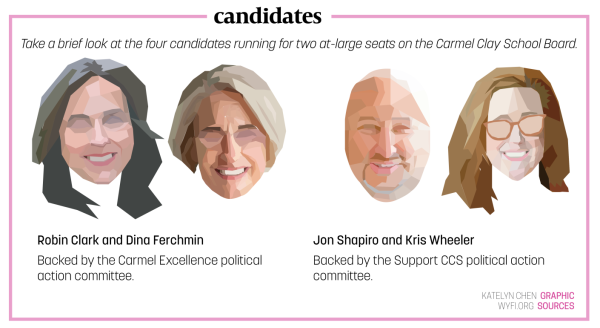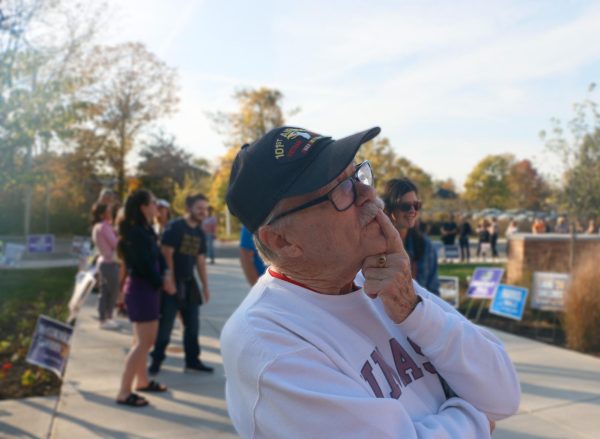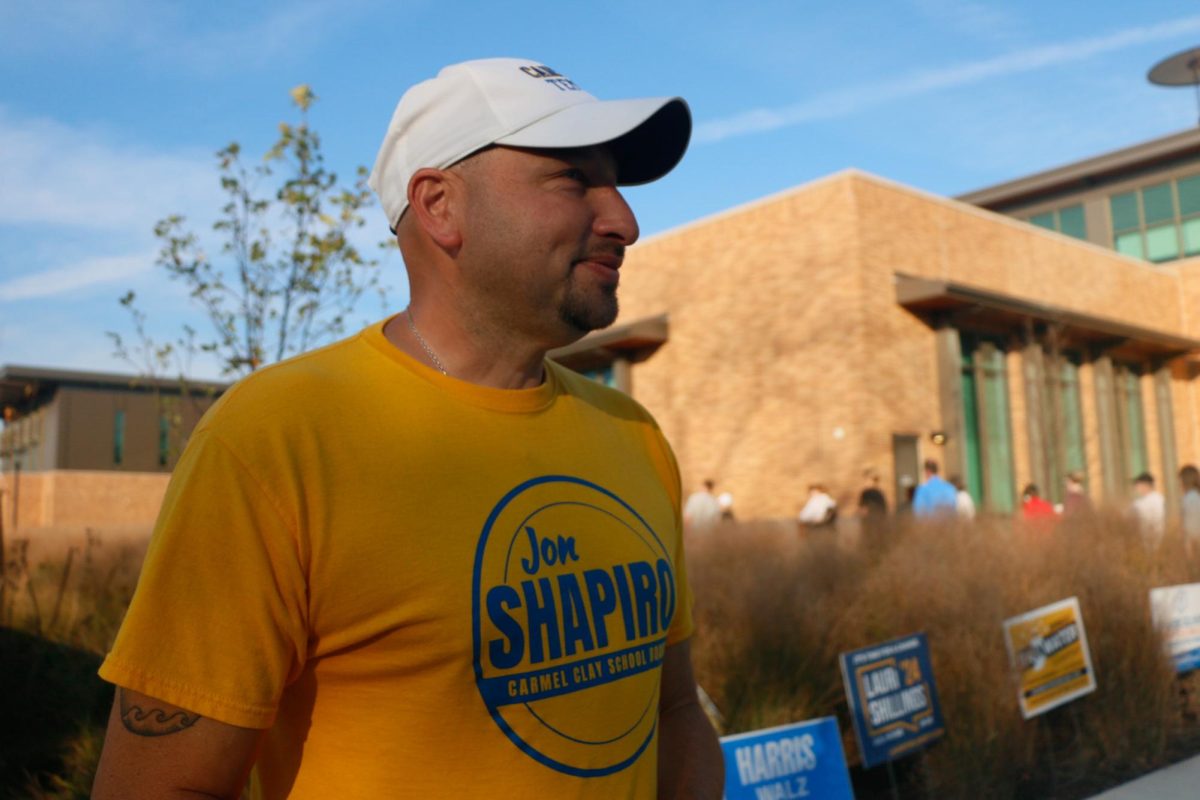In the past few years, school districts across the United States, which have typically been nonpartisan entities, have become increasingly politicized. In 2023, Pew Research quantified a striking partisan divide between the way Democrats and Republicans viewed public education. In the survey, 72% of Democrats said K-12 schools had a positive effect on the United States while 61% of Republicans said K-12 schools were having a negative effect.
Superintendent Michael Beresford said these national trends aligned with his experience serving the Carmel community.
“I would say in the last four years, the topic of CCS schools has become increasingly political,” Beresford said. “The focus became a lot on social issues and on politically motivated actions.”
Two candidates in this year’s school board election, Robin Clark and Dina Ferchmin, have openly campaigned as conservatives and are supported by Carmel Excellence PAC, an organization that “supports common-sense conservative” school board candidates. The two remaining candidates, Kristina Wheeler and Jon Shapiro, are campaigning as non-partisan candidates and are backed by Support CCS, a non-partisan political PAC. Shapiro and Wheeler have received a number of notable endorsements, including those from former Carmel Mayor Jim Brainard, former CHS Principal Tom Harmas, and the Carmel Teachers Association.
Candidate Impacts
Regardless of political affiliation, all CCS school board candidates said they have a vested interest in improving the school district, and each candidate offered different ideas on how to achieve excellence that extended past their website campaign promises.
Wheeler said one of her priorities is making communication between parents and the district streamlined and accessible.
“One of my ideas is what I’ve been calling CCS 411, and it’s a one-stop-shop contact line,” Wheeler said. “It would be either a text message or phone number that parents could text and find out information. We’ve got a lot of schools; we have 16,000 students. Maybe (parents) don’t know what school boundary they’re in or let’s say they had a child that was in need of some special services or they spoke a different language at home. It would just be a one-stop-shop to funnel parent questions into the right place.”
Further, Shapiro said he planned to value the input of community members and parents.
“The school board meeting is a business meeting of the school district. It’s not designed to be a forum or a town hall,” Shapiro said. “And so one of the things I’ve talked about throughout my campaign is how do we create more town halls or forums that allow families and community members to speak with, engage in meaningful dialogue with, school board members. I would pledge, if I was elected as a school board member, that I would host an open house or a town hall or a coffee hour throughout the city at different times so that people can come share questions and concerns or better understand an issue the school district is dealing with.”

Clark said she and Ferchmin were concerned about empowering teachers to maintain classroom decorum. Ferchmin did not respond to a request for an interview.
“Some of the things that teachers expressed to us is lack of support from the administration on discipline in the classroom,” Clark said. “Before (teachers) can even ask the administration for help with discipline, they have to log things so many times in PowerSchool. So they may have a really large class, no teaching assistant and one or more kids acting up. Are they really going to take the time to stop and log that in PowerSchool? In the end, they don’t feel like they’re going to get the support from the teachers or from the administration.”
Shapiro, Clark and Wheeler all said they would ensure competitive teacher pay, involve teachers in curriculum development, promote financial transparency and maximize student academic performance.
However, Shapiro and Clark emphasized that campaign priorities were not guarantees.
“I’m only going to be one of five board members,” Shapiro said. “So my vote isn’t any more or less important than anybody else’s. It’s going to require the five-member board to work together to set priorities and to work towards those priorities in partnership with our school administration.”
Combatting Partisan Influences
In the past few years, Beresford said he saw the fallout of increased partisan interest in school systems manifest in a myriad of ways—sometimes harmless, but mostly harmful.
“When we were doing the referendum last year, I had a ‘vote yes for the CCS referendum’ shirt,” Beresford said. “A gentleman came up to me and told me he’s going to vote no. And I asked, ‘Why are you voting no?’ He said, ‘because I know about your superintendent and his $200,000 car allowance.’ And I went, ‘Wow, the superintendent has a $200,000 car allowance?’ I said, ‘Oh well, I got bad news for you. You’ve gotten misinformation because I am the superintendent of Carmel Clay Schools, and that is my great pickup truck right there that I drive. I can tell you that isn’t a $200,000 car.’”
Beresford also referenced the more serious ramifications of partisan misinformation by citing attacks on multiple teachers, who both Democrat and Republican parents claimed were brainwashing their children.

However, Wheeler and Shapiro said they are working to combat partisan influences in this year’s school board race by condemning overt partisan involvement in school systems.
“I do not believe partisan politics plays a role in school board elections or in our schools,” Shapiro said. “My reasoning for that thinking is that I do not believe that strong public schools are a Democrat or Republican issue. I believe that people choose communities for their strong public schools, which is where 90% of school-aged children attend. That is not anything that a political party should have a hold on and it should not affect the quality of education that a family should be entitled to receive.”
Wheeler added that she wanted to reform the toxic culture currently embroiling school systems.
“I’ve joked with Jon Shapiro that we want to make school boards boring again,” Wheeler said. “I would like to see the temperature come down quite a bit on some of the rhetoric I’m hearing at school board meetings.”
Shapiro also said he was combating misinformation by emphasizing existing ways parents could exercise agency over their child’s academic journey.
“As a parent of a current high school student, I’ve got lots of access to what my student is doing and what the assignments are,” Shapiro said. “Any time I’ve reached out to a teacher or a school administrator, I’ve gotten a response. It’s not always been the response I wanted, but I’ve gotten one, and that’s what I want.”
Conversely, Clark said she and Ferchmin felt expressing partisan values enhanced their respective campaigns.
“What Dina and I do pride ourselves on is we’re very open about what our values are and what our affiliations are,” Clark said. “I think what we need to be concerned about is when people aren’t willing to be open and honest about their partisan connections and their extreme activist histories.”
Gopi Chellapilla, president of the CHS Republicans Club and senior, said he supported school board members that remain focused on improving educational outcomes for all students.
“Schools should focus on promoting the best educational outcomes that students can attain,” Chellapilla said. “I think that they should put more focus on critical thinking, problem solving and communication skills. This would help students with collaboration and social skills.”
Larger Ramifications

After many years serving as superintendent, Beresford said his best advice for voters and students who will vote in the future is to do thorough research on board members before heading to the polls.
“Most of the candidates say the exact same things: they want to support the teachers; they want a good curriculum; they want more transparency,” Beresford said. “When all four candidates are saying pretty much the same thing, it’s hard to delineate who to pick. So I think that research is most important. The three most important words: research, research and research. After that, you look at how the candidates have supported the school district in the past, especially in the last three or four years.”
Ultimately, Shapiro emphasized the importance of a strong public education system in the short and long term.
“Public education has the opportunity to be a great equalizer and allow every young person the opportunity to find their path as a young adult,” Shapiro said. “Our students are the future of our communities. Whether you choose to live in Carmel or you go elsewhere, you all are going to be running businesses here and elsewhere. You’re going to be holding elected office here and elsewhere. The way we ensure the continuity of a civic society is by guaranteeing high quality public education for anybody who lives here.”

































![AI in films like "The Brutalist" is convenient, but shouldn’t take priority [opinion]](https://hilite.org/wp-content/uploads/2025/02/catherine-cover-1200x471.jpg)









































![Review: “The Immortal Soul Salvage Yard:” A criminally underrated poetry collection [MUSE]](https://hilite.org/wp-content/uploads/2025/03/71cju6TvqmL._AC_UF10001000_QL80_.jpg)
![Review: "Dog Man" is Unapologetically Chaotic [MUSE]](https://hilite.org/wp-content/uploads/2025/03/dogman-1200x700.jpg)
![Review: "Ne Zha 2": The WeChat family reunion I didn’t know I needed [MUSE]](https://hilite.org/wp-content/uploads/2025/03/unnamed-4.png)
![Review in Print: Maripaz Villar brings a delightfully unique style to the world of WEBTOON [MUSE]](https://hilite.org/wp-content/uploads/2023/12/maripazcover-1200x960.jpg)
![Review: “The Sword of Kaigen” is a masterpiece [MUSE]](https://hilite.org/wp-content/uploads/2023/11/Screenshot-2023-11-26-201051.png)
![Review: Gateron Oil Kings, great linear switches, okay price [MUSE]](https://hilite.org/wp-content/uploads/2023/11/Screenshot-2023-11-26-200553.png)
![Review: “A Haunting in Venice” is a significant improvement from other Agatha Christie adaptations [MUSE]](https://hilite.org/wp-content/uploads/2023/11/e7ee2938a6d422669771bce6d8088521.jpg)
![Review: A Thanksgiving story from elementary school, still just as interesting [MUSE]](https://hilite.org/wp-content/uploads/2023/11/Screenshot-2023-11-26-195514-987x1200.png)
![Review: "When I Fly Towards You", cute, uplifting youth drama [MUSE]](https://hilite.org/wp-content/uploads/2023/09/When-I-Fly-Towards-You-Chinese-drama.png)
![Postcards from Muse: Hawaii Travel Diary [MUSE]](https://hilite.org/wp-content/uploads/2023/09/My-project-1-1200x1200.jpg)
![Review: "Ladybug & Cat Noir: The Movie," departure from original show [MUSE]](https://hilite.org/wp-content/uploads/2023/09/Ladybug__Cat_Noir_-_The_Movie_poster.jpg)
![Review in Print: "Hidden Love" is the cute, uplifting drama everyone needs [MUSE]](https://hilite.org/wp-content/uploads/2023/09/hiddenlovecover-e1693597208225-1030x1200.png)
![Review in Print: "Heartstopper" is the heartwarming queer romance we all need [MUSE]](https://hilite.org/wp-content/uploads/2023/08/museheartstoppercover-1200x654.png)



